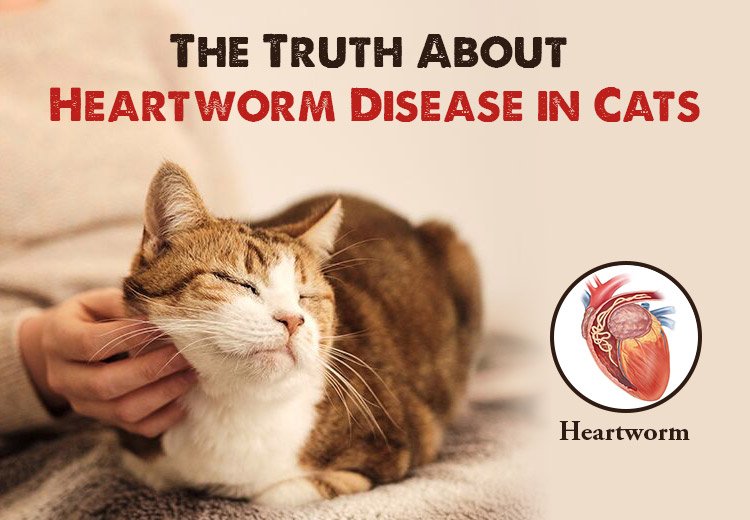 Jan 16, 2023
Jan 16, 2023

Heartworm is a deadly parasite that lives on the respiratory and cardiac organs of dogs and cats. These pests travel through mosquitoes, if an infected mosquito bites cats it will transmit into the cat's body. It usually takes three to four months for cats to get infected with heartworm disease after mosquito infestation. Heartworm in cats is one of the fatal diseases that severally affect your cat's health and also leads to death if not prevented at right time.
Heartworm is a preventive treatment. Although the awareness around heartworm in pets has increased, there are still many myths that are keeping pet parents in dilemma. With this blog, we are busting some common myths around heartworm disease in cats so that you can have a right and reliable heartworm preventive approach for your cat.
Indoor cats are less exposed to the outer world and thus many of us think they don't catch up with heartworm. However, that is not true, it takes only one infected mosquito to bite your cat and get it infected with heartworm disease. It then takes three to four months for a heartworm to grow into an adult and reach the heart, that's the time when you notice heartworm symptoms.
Heartworm infection is generally less common in cats compared to dogs, with infection rates in cats being about 5-20% of those in dogs in the same area. However, heartworm infection in cats still exists and the concern should be taken seriously. It is important to take steps to protect both cats and dogs from heartworms, as infection can still occur in cats despite their relative resistance.
Irrespective of the name; heartworm in cats doesn't infect the heart primarily but the lungs and arteries. Heartworm can cause inflammation in these organs resulting in minor or severe health conditions including coughing, difficulty breathing, vomiting, weight loss, and lethargy. Heartworm infection can be life-threatening for cats, and treatment can be difficult and costly.
Cats of all ages and weights can get infected with heartworms, after-all it's spread through mosquitoes. It is important to protect cats and kittens from heartworms, especially in areas where the disease is prevalent. Kittens can start taking preventive treatment as young as 8 weeks of age to help protect them from heartworms. It is important to follow your veterinarian's recommendations for preventive care, especially during the heartworm transmission season.
Heartworm infection can be difficult to treat in cats and can be life-threatening. There is no approved treatment for heartworm infection in cats, and the available options are often costly and may not be effective. In some cases, treatment may involve the use of preventives to kill adult worms and manage the symptoms of the infection, such as coughing and difficulty breathing. However, these treatments can be associated with significant risks, and the success of treatment can vary.
It is important to note that prevention is the best approach to protecting cats from heartworm infection. Using preventive treatments and avoiding exposure to mosquitoes can help to reduce the risk of heartworm infection in cats.
Using preventive treatment is the best and most reliable way to prevent heartworm infection in cats. Heartworm preventive treatment is usually administered on monthly basis and comes in various options depending upon the cat's needs and circumstances.
Some of the commonly used heartworm preventives include the following:
Revolution Plus is a spot-on treatment that is applied to cats' skin. It contains three active ingredients: Selamectin, Sarolaner, and Moxidectin, which work together to protect against a wide range of parasites, including heartworms, fleas, ticks, and ear mites. It is used once every month.
Bravecto Plus contains two active ingredients: Fluralaner and Moxidectin, which work together to protect against a wide range of parasites, including heartworms, fleas, ticks, and intestinal worms. It is a chewable treatment that is administered orally once every 12 weeks.
Advantage Multi contains two active ingredients: Imidacloprid and Moxidectin, which work together to protect against a wide range of parasites, including heartworms, fleas, ticks, and intestinal worms. It is applied topically to the skin and is usually given monthly.
Prevention Checklist
Along with using the above treatment, following the below-mentioned practices will reduce the chance of heartworm infection in cats.
Bottom line:
Please note that once heartworm turns into an adult and reaches the heart of your cat, treating it is difficult, unreliable and costly. It is only possible to control the symptoms of heartworm disease in the last stages like coughing difficulty in breathing and more. Thus using the preventive treatment for a cat is a must once it is above 8 weeks of age. To get the best deal on cat heartworm treatment visit PetCareClub where you get the best of the treat at deal breaking price.
 Jan 04, 2024
Jan 04, 2024
For pet parents, celebrating their furry babies is one of the most rewarding experiences. The best part is that here in the US, we have man...
 Dec 21, 2023
Dec 21, 2023
With winter approaching, we can’t wait for those snowball fights, warm fires, and cozy blankies; but with it, we would also be more s...